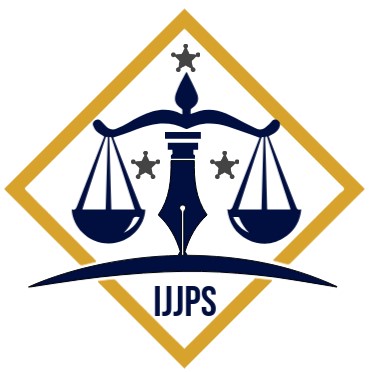INTERNATIONAL JOURNAL OF JUSTICE AND POLICE SCIENCES
A Gold Open Access Quarterly Official Journal of the
PUBLICATION ETHICS AND
MALPRACTICE STATEMENT
The International Journal of Justice and Police Sciences (IJJPS) is committed to upholding the highest standards of publication ethics and combating publication malpractice. To ensure the integrity of scholarly publishing, the journal adheres to internationally recognized ethical guidelines and expects all parties involved in the publication process—authors, editors, reviewers, and publishers—to conform to these principles.
1. Responsibilities of Authors
-
Originality and Plagiarism:
Authors must ensure that their work is original and free from plagiarism. Proper acknowledgment of all sources must be made, and content must not be submitted to multiple publications simultaneously. -
Data Integrity:
All data presented must be accurate and free from manipulation. Authors should retain raw data for review if requested and provide transparency in data sharing. -
Disclosure of Conflicts of Interest:
Authors must disclose any financial or non-financial conflicts of interest that might influence their research. -
Corrections and Retractions:
If significant errors or inaccuracies are discovered after publication, authors must notify the editorial team promptly and cooperate in issuing corrections or retractions as necessary.
2. Responsibilities of Editors
-
Editorial Independence:
Editors are responsible for evaluating manuscripts based solely on their academic merit and relevance to the journal’s scope, without bias regarding the author’s race, gender, ethnicity, nationality, or institutional affiliation. -
Confidentiality:
Editors must ensure that submitted manuscripts are treated with confidentiality and shared only with relevant parties, such as reviewers or other editorial board members. -
Conflict of Interest:
Editors must avoid any conflicts of interest with authors or reviewers. When conflicts arise, editors should delegate decision-making to another qualified editorial board member. -
Handling Ethical Concerns:
Editors must investigate and act upon ethical concerns raised about submitted or published manuscripts, including issuing corrections, retractions, or expressions of concern.
3. Responsibilities of Reviewers
-
Contribution to Editorial Decisions:
Reviewers play a critical role in improving the quality of submissions through constructive feedback. They should assess manuscripts objectively and provide recommendations within the specified timeline. -
Confidentiality:
Manuscripts reviewed must be treated as confidential documents and not shared with others without the editor’s explicit permission. -
Acknowledgment of Sources:
Reviewers must point out any missing citations or similarities to other published works. -
Avoiding Conflicts of Interest:
Reviewers must disclose any potential conflicts of interest that could affect their objectivity and must recuse themselves from reviewing manuscripts when conflicts exist.
4. Responsibilities of the Publisher
-
Ethical Oversight:
The publisher ensures that all published content adheres to ethical standards and supports the journal in addressing ethical issues transparently and effectively. -
Accessibility and Archiving:
The publisher commits to maintaining the journal’s long-term availability and integrity through reliable archiving practices. -
Accountability:
The publisher ensures that commercial interests do not influence editorial decisions and that all parties involved in the publication process comply with ethical policies.
5. Addressing Publication Malpractice
IJJPS takes a zero-tolerance approach to publication malpractice, including plagiarism, fabrication, falsification, and duplicate submissions. Reports of misconduct will be investigated thoroughly, following COPE (Committee on Publication Ethics) guidelines. Where misconduct is confirmed, appropriate corrective action, such as withdrawal or retraction of the work, will be taken.
By adhering to these principles, the International Journal of Justice and Police Sciences (IJJPS) aims to foster trust, accountability, and scholarly excellence within the academic community.
For further inquiries or concerns about our ethical policies, please contact: justicepolicejournal@gmail.com
-

ISSN: Awaited
EDITORIAL BOARD
Editor-in-Chief
Karuppannan
Jaishankar
International Institute
of Justice & Police
Sciences, India
Editor
Alaeldin Magaireh
Ajman University, UAEAssociate Editors
Hai Thanh Luong
Griffith University,
Australia
Mary Makinde
Canterbury Christ Church
University, UK
E. Enanalap Periyar
Manonmaniam
Sundaranar University,
India
Mark H. Beaudry
Worcester State University,
USA
Vasileios
Karagiannopoulos
University of
Portsmouth, UKAssistant Editors
Praveen Rao Bolli
Virginia State University,
USA
Momina Zahan
Banasthali Vidyapith,
India
Editorial Assistants
Deepti Bista (Nepal)
Uniqua Singh (India)
Abhijit Chanda, (India)
Pradeep Kumar Singh (India)
INTERNATIONAL EDITORIAL ADVISORY BOARD
Ali Wardak (UK/Afghanistan)
Barbara Vettori (Italy)
Dominque Wisler (Congo)
Emilio C. Viano (USA)
Eric Chui (Hong Kong)
Eric G. Lambert (USA)
Fasihuddin (Pakistan)
George E. Higgins (USA)
Glenn Davis (Australia)
Gloria Laycock (UK)
Gorazd Meško (Slovenia)
Graeme Newman (USA)
Ihekwoaba D. Onwudiwe (USA)
Joanna Shapland (UK)
Jody Miller (USA)
K. S. Hamid (Malaysia)
Kam C Wong (USA/China)
Keith D. Harries (USA)
Liqun Cao (Canada)
M. C. Yubaraj Sangroula (Nepal)
Marc Groenhuijsen (The Netherlands)
Mark David Chong (Australia)
Matthew Robinson (USA)
Michael Pittaro (USA)
Muzammil Querishi (UK)
Nick Tilley (UK)
Nimrod Kozlovski (Israel)
Preet (S.K.) Nijhar (UK)
Sneh Lata Tandon (India)
Stanley Yeldell (USA)
Stephen Z Levine (Israel)
Sudipto Roy (USA/India)
Tina Patel (UK)
Vesna Nikolic-Ristanovic (Serbia)
Yuning Wu (USA/China)
© 2025 International Institute of Justice and Police Sciences. All rights reserved
Web Journal created, published and maintained by Dr. K. Jaishankar Last updated 13/12/2024